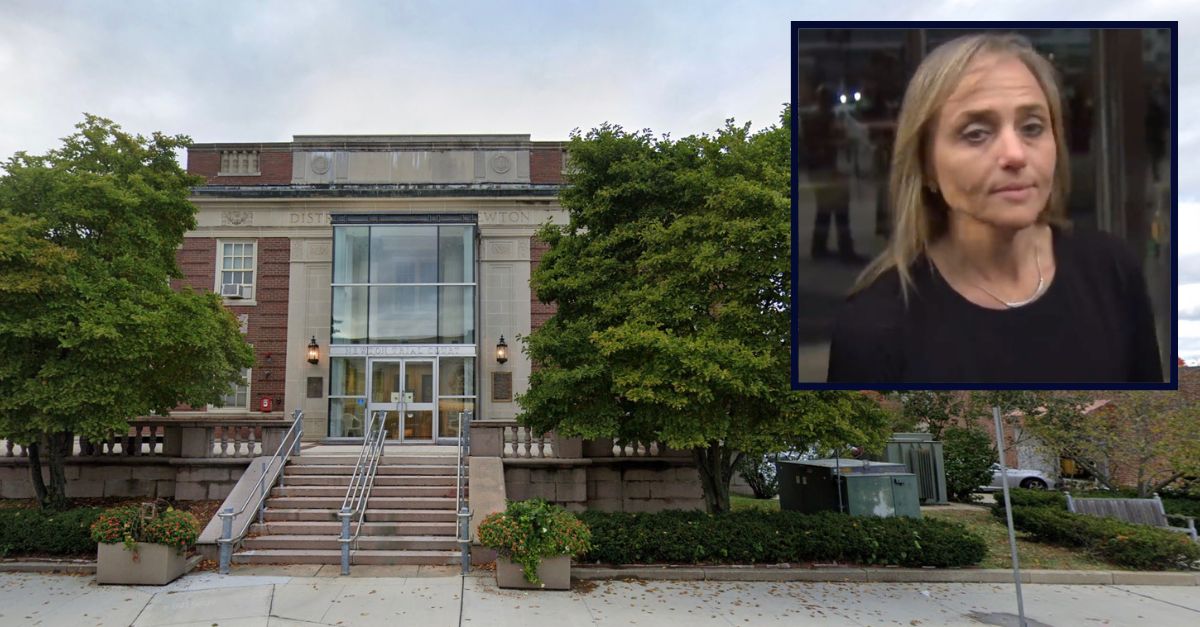
Inset: Newton District Court Judge Shelley Joseph (WBZ). Background: Newton District Courthouse (Google Maps).
A Massachusetts state judge accused of helping an undocumented immigrant sneak out of her courtroom to elude federal immigration officers should be publicly reprimanded for "inadvertently" appearing biased and violating a court rule.
However, Judge Shelley Joseph should retain her position on the bench because she was not aware of the defendant's plan to escape the courthouse and flee from Immigration and Customs Enforcement (ICE) agents, according to a detailed 117-page report from a hearing officer with the Massachusetts Commission on Judicial Conduct (CJC).
The high-profile case against Joseph is based on allegations strikingly similar to those facing Milwaukee County Judge Hannah C. Dugan in Wisconsin. Both judges are accused of helping migrants evade capture by ICE.
As Law&Crime previously reported, Joseph was accused of assisting Jose Medina-Perez, an undocumented immigrant who had been twice deported from the United States, with avoiding capture. Medina-Perez was arrested again in 2018 and facing his third deportation when an ICE officer arrived in Joseph's courtroom to pick him up for potential removal.
In the courtroom, discussion ensued as to whether Medina-Perez had been properly identified by ICE.
Ultimately, at the judge's direction, a court clerk told the ICE officer to wait outside the courtroom while Medina-Perez, with assistance from a court officer, then left the courtroom and exited through one of the building's rear doors.
Love true crime? Sign up for our newsletter, The Law&Crime Docket, to get the latest real-life crime stories delivered right to your inbox.
While prosecutors indicted Joseph on federal criminal charges during Trump's first term, the Biden administration dropped those charges in 2022 on the condition that Joseph place herself at the mercy of the professional conduct panel. The panel charged her with five civil conduct violations, saying she brought "disrepute" to the office through "willful judicial misconduct" as well as "conduct prejudicial to the administration of justice and unbecoming of a judicial officer."
A special counselor for CJC sought to have Joseph permanently suspended from her position for "willfully" facilitating the escape, arguing that she could no longer "command the respect and authority essential to judicial function."
In his report, Denis J. McInerney determined that such drastic action was unnecessary, writing:
While I fully share the view that public trust in the judiciary is an important consideration, I disagree that Judge Joseph is unable to command the public's respect and authority in the future. Indeed, one of the reasons that this Report is as detailed as it is, and that I am recommending that the proposed reprimand of Judge Joseph be public, is in an effort to help ensure that. Since the events of her less than seven-minute conference in the Medina-Perez proceeding on the afternoon of April 2, 2018, Judge Joseph has repeatedly demonstrated through her conduct, including her candor during the investigation and hearing in this matter and her engagement in public service while suspended from her judicial duties, that she is a thoughtful, diligent, and conscientious judge undeserving of the harsh public criticism she has received in connection with this matter, and entirely worthy of the opportunity to finally move on from it.
McInerney also reiterated that there was "no credible evidence" indicating that Joseph was aware of the defendant's intent to flee the courthouse.
"I find that Judge Joseph did not know about — much less authorize — the escape plan, and did not mislead court authorities following the incident," he wrote in the report, which was publicly released on Thursday following two hearings in June.
But McInerney went on to write that Joseph's "statements and actions" during the hearing that preceded the escape "created the appearance of impropriety and bias."
The proposed reprimand from McInerney reads as follows:
"Judge Shelley M. Richmond Joseph is hereby publicly reprimanded for having inadvertently created the appearance of impropriety and bias through her communications with the defense counsel and assistant district attorney during a defendant's arraignment, and for unknowingly violating a court rule by granting the defense counsel's request to go off the record during a discussion regarding immigration authorities' interest in taking custody of the defendant. For the avoidance of doubt, because the record does not support a finding that Judge Joseph engaged in any intentional misconduct — including (1) authorizing the defense counsel's plan to enable the defendant to evade immigration authorities, or (2) misleading court authorities when discussing her actions on the day of the defendant's arraignment — she is not being reprimanded for any such alleged conduct."
The report has already been sent to the state's Supreme Judicial Court, which will ultimately issue a final determination on the matter. The Supreme Judicial Court is not required to follow McInerney's recommendation and can impose a punishment of its choosing.
Joseph's attorney, Thomas M. Hoopes, provided a statement on the proceedings to Bloomberg Law.
"An impartial hearing officer has finally separated fact from politically and personally motivated fiction and found Judge Joseph had no role in the escape of the defendant from the Newton District Court engineered by the defense attorney, and she was completely honest with her supervisors," the statement said.
Comments